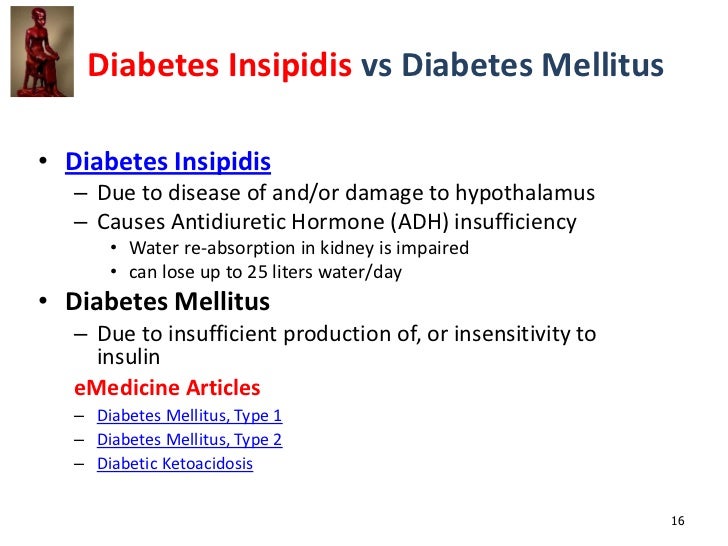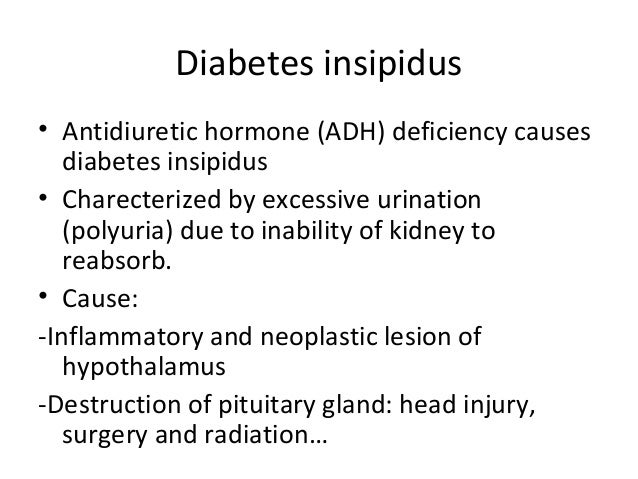Diabetes Insipidus Hormon

Diabetes Insipidus You And Your Hormones From The
In diabetes insipidus, either insufficient vasopressin is released, or the kidneys are resistant to the hormone. testing these dysfunctions will help define and treat the type of diabetes insipidus. An infant or young child with diabetes insipidus may have the following signs and symptoms: heavy, wet diapers bed-wetting trouble sleeping fever vomiting constipation delayed growth weight loss.

(vasopressin is also called antidiuretic hormone or adh. ) when your body doesn’t make enough vasopressin, the condition is called central diabetes insipidus. if you make enough but your kidneys. Alternative names for diabetes insipidus. water diabetes; di. what is diabetes insipidus? anti-diuretic hormone (also called vasopressin) is produced in the hypothalamus and then secreted by the pituitary gland into the bloodstream at the base of the brain. anti-diuretic hormone is needed to control the fluid balance in the body. it does this by diabetes insipidus hormon making the kidneys produce more concentrated urine.
Diabetes insipidus wikipedia.
Diabetes Insipidus Causes Symptoms And Treatment
Diabetesinsipidus Gejala Penyebab Dan Mengobati
What is diabetes insipidus (di) and siadh. both diabetes insipidus (di) and syndrome of inappropriate antidiuretic hormone secretion (siadh) are both disorders of water regulation impacting the release or activity of anti-diuretic hormone (adh) in the body. in siadh, antidiuretic hormone is not suppressed causing significant electrolyte abnormalities and water retention. Central diabetes insipidus is a lack of the hormone vasopressin (antidiuretic hormone) that causes excessive production of very dilute urine (polyuria). central diabetes insipidus has several causes, including a brain tumor, a brain injury, brain surgery, tuberculosis, and some forms of other diseases.
Gestational diabetes insipidus. treatment for most people with gestational diabetes insipidus is with the synthetic hormone desmopressin. primary polydipsia. there is no specific treatment for this form of diabetes insipidus, other than decreasing fluid intake. Diabetesinsipidus and syndrome of inappropriate anti-diuretic hormone [siadh] have some similarities, but are two very different conditions. they both involve how the body create vasopressin [adh] and one of the primary symptoms of both conditions is excessive thirst, but the results are completely the opposite. in diabetes insipidus, the body is excreting too many Diabetesinsipidus sendiri terbagi menjadi dua jenis utama, yaitu: diabetes insipidus kranial. diabetes insipidus jenis ini yang paling umum terjadi. disebabkan tubuh tidak memiliki cukup hormon antidiuretik dari hipotalamus. kondisi ini bisa disebabkan oleh kerusakan pada hipotalamus atau pada kelenjar pituitari.
Diabetes Insipidus Di Symptoms Causes Diagnosis
See more videos for diabetes insipidus hormone. Diabetes insipidus (di) is a condition characterized by large amounts of dilute urine and increased thirst. the amount of urine produced can diabetes insipidus hormon be nearly 20 liters per day. reduction of fluid has little effect on the concentration of the urine. complications may include dehydration or seizures.. there are four types of di, each with a different set of causes.
Introduction. diabetes insipidus (di) is a disorder of water homeostasis that is characterized by excretion of large volumes of hypotonic urine either due to the deficiency of the hormone arginine vasopressin diabetes insipidus hormon [avp, also known as antidiuretic hormone (adh)], or due to resistance to the action of avp on its receptors in the kidneys (1,2). large volumes of urine excretion, also known as polyuria. One of those is a disease caused diabetes insipidus. the relationship between diabetes insipidus and adh is clear: when the anti-diuretic hormone isn’t communicating properly or isn’t being heard by a person’s kidneys, then this disease will cause excessive thirst and urination.
Treatment for frequent urination or constant thirst depends on the patient’s type of diabetes insipidus: central diabetes insipidus. a synthetic, or man-made, hormone called desmopressin treats central diabetes insipidus. the nephrogenic diabetes insipidus. in some cases, nephrogenic diabetes. What is diabetes insipidus? diabetes insipidus (di) is a rare condition that leads to frequent urination (passing a lot of clear urine) and excessive thirst. the condition may be caused by problems with your pituitary gland and/or your kidneys. di is not related to diabetes mellitus (type 1 and type 2 diabetes), which is when diabetes insipidus hormon your levels of. Diabetes insipidus and diabetes mellitus—which includes both type 1 and type 2 diabetes—are unrelated, although both conditions cause frequent urination and constant thirst. diabetes mellitus causes high blood glucose, or blood sugar, resulting from the body's inability to use blood glucose for energy.
Diabetes insipidus (di) is a disorder characterized by excretion of large amounts of hypotonic urine. central di results from a deficiency of the hormone arginine vasopressin (avp) in the pituitary gland or the hypothalamus, whereas nephrogenic di results from resistance to avp in the kidneys. Hormones and me diabetes insipidushormones are chemicals that carry messages from one cell to another. a hormone is produced in one area of the body and carried via the bloodstream to another different area where it produces its effect. a part of the brain called the hypothalamus controls the level of many.
The human body is a remarkable wonder of nature. it is a self-managing system that makes life possible, but sometimes a few hiccups come along to disrupt its cycles. one of those is a disease caused diabetes insipidus. the relationship between diabetes insipidus and adh is clear: when the anti-diuretic hormone isn’t communicating properly or Diabetes insipidus is a rare condition in which there is a problem with the secretion of antidiuretic hormone. patients with diabetes insipidus have high amounts of urine that is diluted (clear) because of this inability to control the amount of water in the urine.
Diabetes insipidus sendiri terbagi menjadi dua jenis utama, yaitu: diabetes insipidus kranial. diabetes insipidus jenis ini yang paling umum terjadi. disebabkan tubuh tidak memiliki cukup hormon antidiuretik dari hipotalamus. kondisi ini bisa disebabkan oleh kerusakan pada hipotalamus atau pada kelenjar pituitari.
Diabetes insipidus ( di) is a condition characterized by large amounts of dilute urine and increased thirst. the amount of urine produced can be nearly 20 liters per day. reduction of fluid has little effect on the concentration of the urine. complications may include dehydration or seizures. Diabetes insipidus and syndrome of inappropriate anti-diuretic hormone [siadh] have some similarities, but are two very different conditions. they both involve how the body create vasopressin [adh] and one of the primary symptoms of both conditions is excessive thirst, but the results are completely the opposite. Central diabetes insipidus. damage to the pituitary gland or hypothalamus from surgery, a tumor, a head injury or an illness can cause central diabetes insipidus by affecting the usual production, storage and release of adh. an inherited genetic disease can also cause this condition. nephrogenic diabetes insipidus. 6. mao jf, zhang jl, nie m, lu sh, wu xy. diabetes insipidus as the first symptom caused by lung cancer metastasis to the pituitary glands: clinical presentations, diagnosis, and management. j postgrad med. 2011; 57(4): pp. 302–306. doi: 10. 4103/0022-3859. 90080. 7. bichet dg. clinical manifestations and causes of central diabetes insipidus.
The symptoms of diabetes insipidus include: too much urine production (polyuria) ranging from 3–18 litres a day. effectively, this means that the patient will need excessive thirst (polydipsia). this means that the patient will need to drink considerably more than normal. passing urine too often. Diabetes insipidus (di) is a rare condition that leads to frequent urination (passing a lot of clear urine) and excessive thirst. the condition may be caused by problems with your pituitary gland and/or your kidneys. di is not related to diabetes mellitus (type 1 and type 2 diabetes), which is when your levels of blood sugar (glucose) are too high.


Diabetes insipidus (di) is caused by a problem with either the production, or action, of the hormone vasopressin (avp). if you have di your kidneys are unable to retain water. this leads to the production of large volumes of urine and, in diabetes insipidus hormon turn, greatly increased thirst. More diabetes insipidus hormone images.
Comments
Post a Comment